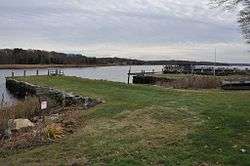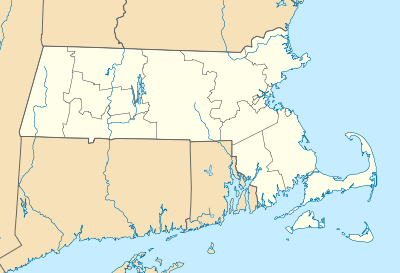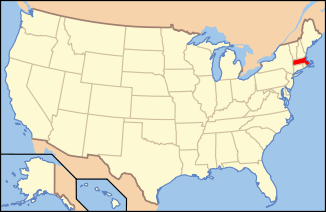Dighton Wharves Historic District
|
Dighton Wharves Historic District | |
 (From Left to Right: The Spooner Wharf, The Andrews Wharf, and The Perry Wharf). The Andrews and Spooner Wharves remain as they were when constructed, while the Perry Wharf was renovated to its present form in the early 2000s. | |
  | |
| Location | Dighton, Massachusetts |
|---|---|
| Coordinates | 41°48′31″N 71°7′16″W / 41.80861°N 71.12111°WCoordinates: 41°48′31″N 71°7′16″W / 41.80861°N 71.12111°W |
| Area | 5.5 acres (2.2 ha) |
| Built | 1730 |
| Architect | Elkanah Andrews, Darius Perry |
| Architectural style | Georgian, Greek Revival, Cape Cod |
| NRHP Reference # | [1] |
| Added to NRHP | July 17, 1997 |
The Dighton Wharves Historic District is a historic district at 2298-2328 Pleasant Street in Dighton, Massachusetts. It encompasses an area that was in the 18th and 19th centuries a port facility on the Taunton River for the town, including three 18th-century wharves and four houses of early to mid 18th-century construction.[2] The district was added to the National Register of Historic Places in 1997.[1]
Description and history
The town of Dighton, located on the west bank of the Taunton River in central Bristol County, Massachusetts, was settled by European colonists in the 1680s and incorporated as a town in 1712. It became significant as a maritime shipping endpoint in the 18th century because seagoing vessels were unable navigate further up the river. As a result, shipyards and wharves were built in several places on the banks of the river. This district is located in the south-central part of the town's waterfront, just south of Muddy Cove, where there was also at one time a ferry service across the river. The area declined in importance as a shipping center due to the ascendancy of Fall River as a deep-water shipping destination.[2]
The district extends along Pleasant Street, which runs close to the river, and includes four houses on the west side of the road, and three wharves that jut into the river. At the southern end of the district stand the house and wharf of Darius Perry, a ship's captain who sailed to the West Indies. His house, built about 1750, is a 1-1/2 story Cape that has repeatedly been enlarged and extended over the following centuries, but its basic form is still recognizable and its interior has been preserved. His wharf is about 30 feet (9.1 m) wide and a similar length, and was hand-built out of dry-laid stone, as were the other two wharves.[2]
North of Perry's house stands the Eddy House (2320 Pleasant Street), a 3-story Georgian style house, which was built about 1730 and given extensive Italianate styling about 1870. This house, along with the two remaining houses, were all built by Elkanah Andrews, another West Indies merchant who built one for himself and the other for two sons. It was acquired by Darius Perry in 1825 for his daughter and son-in-law, Captain William Eddy. The Eddys operated a guest house on the premises from the 1870s to mid 1900s.[2]
The next house was Andrews' own house (2308 Pleasant Street), was built about 1740, and is an imposing 2-1/2 story structure. It was restyled about 1830 with an elaborate Greek Revival treatment. Andrews was probably responsible for the construction of the Spooner Wharf, which stands opposite this house, and the Andrews Wharf to its north. The Spooner Wharf is similar to that of Perry, while the Andrews Wharf is the longest of the three, at 70 feet (21 m). Andrews' house was purchased in 1803 by Captain James Spooner, a wealthy Rhode Island ship's captain.[2]
At the northern end of the district stands the "Old Customs House", built by Andrews for his son Thomas about 1770. Between 1809 and 1834 it was owned by members of the Williams family, who acted as local customs collectors, and had one of the house's rear rooms outfitted as a small customs office. This house, like that of Andrews, was restyled in with Greek Revival features.[2]
See also
References
- 1 2 National Park Service (2008-04-15). "National Register Information System". National Register of Historic Places. National Park Service.
- 1 2 3 4 5 6 "NRHP nomination form and MACRIS inventory record for Dighton Wharves Historic District". Commonwealth of Massachusetts. Retrieved 2015-07-31.
